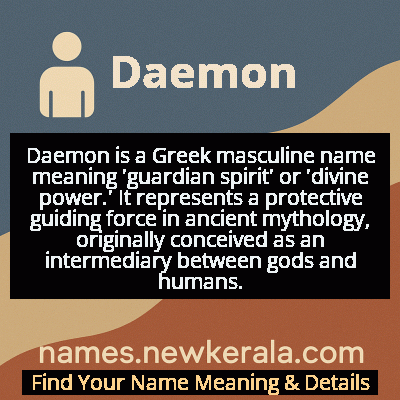Daemon Name Meaning & Details
Origin, Popularity, Numerology Analysis & Name Meaning of Daemon
Discover the origin, meaning, and cultural significance of the name DAEMON. Delve into its historical roots and explore the lasting impact it has had on communities and traditions.
Name
Daemon
Gender
Male
Origin
Greek
Lucky Number
7
Meaning of the Name - Daemon
Daemon is a Greek masculine name meaning 'guardian spirit' or 'divine power.' It represents a protective guiding force in ancient mythology, originally conceived as an intermediary between gods and humans.
Daemon - Complete Numerology Analysis
Your Numerology Number
Based on Pythagorean Numerology System
Ruling Planet
Neptune (Ketu)
Positive Nature
Intuitive, analytical, spiritual, and inquisitive.
Negative Traits
Secretive, reserved, aloof, and can be overly critical.
Lucky Colours
Green, yellow.
Lucky Days
Monday.
Lucky Stones
Cat’s eye, moonstone.
Harmony Numbers
1, 5, 6.
Best Suited Professions
Scientists, researchers, spiritual leaders, detectives.
What People Like About You
Depth of knowledge, analytical skills, spirituality.
Famous People Named Daemon
Daemon Targaryen
Fictional Prince
Key figure in George R.R. Martin's 'Fire & Blood' and House of the Dragon
Daemon Blackfyre
Fictional Warrior
Founder of the Blackfyre rebellion in George R.R. Martin's 'A Song of Ice and Fire' universe
Daemon Tools
Software
Popular disk image emulation software used worldwide since 2000
Name Variations & International Equivalents
Click on blue names to explore their detailed meanings. Gray names with will be available soon.
Cultural & Historical Significance
The original Greek daemon was neither good nor evil but represented divine power manifesting in human lives. Different types of daemons existed, including agathodaimones (good spirits) and kakodaimones (harmful spirits). The philosophical schools, particularly Platonism and Stoicism, developed sophisticated theories about daemons as intermediaries in the cosmic hierarchy. This rich cultural heritage makes Daemon a name that connects its bearer to one of the most profound and complex concepts in Western spiritual and philosophical tradition.
Extended Personality Analysis
Individuals named Daemon are often perceived as strong-willed, protective, and possessing natural leadership qualities. They tend to be charismatic and influential, with an innate ability to guide or inspire others, reflecting the name's original meaning as a guiding spirit. There's frequently an intensity about them, combined with deep loyalty to those they care about. They may exhibit a dual nature—capable of great benevolence and protection, yet potentially formidable when challenged.
This complex personality profile aligns with the mythological daemon's role as neither purely good nor evil, but as a powerful force that could manifest differently depending on circumstances and perspective. People with this name often display independence of thought and action, sometimes appearing rebellious or unconventional. They typically possess strong intuition and may be drawn to positions where they can exercise influence or protection over others. The name suggests someone who operates by their own moral compass rather than external expectations, embodying the ancient concept of following one's personal daimon or inner guiding principle.
Modern Usage & Popularity
In contemporary times, Daemon has experienced a resurgence, particularly in fantasy literature and among parents seeking unique, powerful names with classical roots. The name remains relatively uncommon but has gained traction through popular culture references, especially in George R.R. Martin's works. It appeals to those interested in mythology and strong, distinctive names. While the spelling 'Daemon' helps distinguish it from the modern word 'demon,' the name still carries an edgy, unconventional quality that limits its mainstream popularity but enhances its appeal in certain subcultures and creative communities. The computing term 'daemon' for background processes has also contributed to its modern recognition, particularly in tech circles.
Symbolic & Spiritual Meanings
Symbolically, Daemon represents guidance, inner voice, and the connection between mortal and divine realms. It embodies the concept of personal genius or tutelary spirit—the idea that each person has a unique guiding force. The name also symbolizes transformation and the duality of power, capable of both protection and destruction depending on its application. In modern interpretations, it often represents rebellion against conventional thinking and the courage to follow one's own path, regardless of external opinions or traditional boundaries. The symbolic meaning extends to representing the unconscious mind or the deeper aspects of personality that guide conscious decisions and actions.

